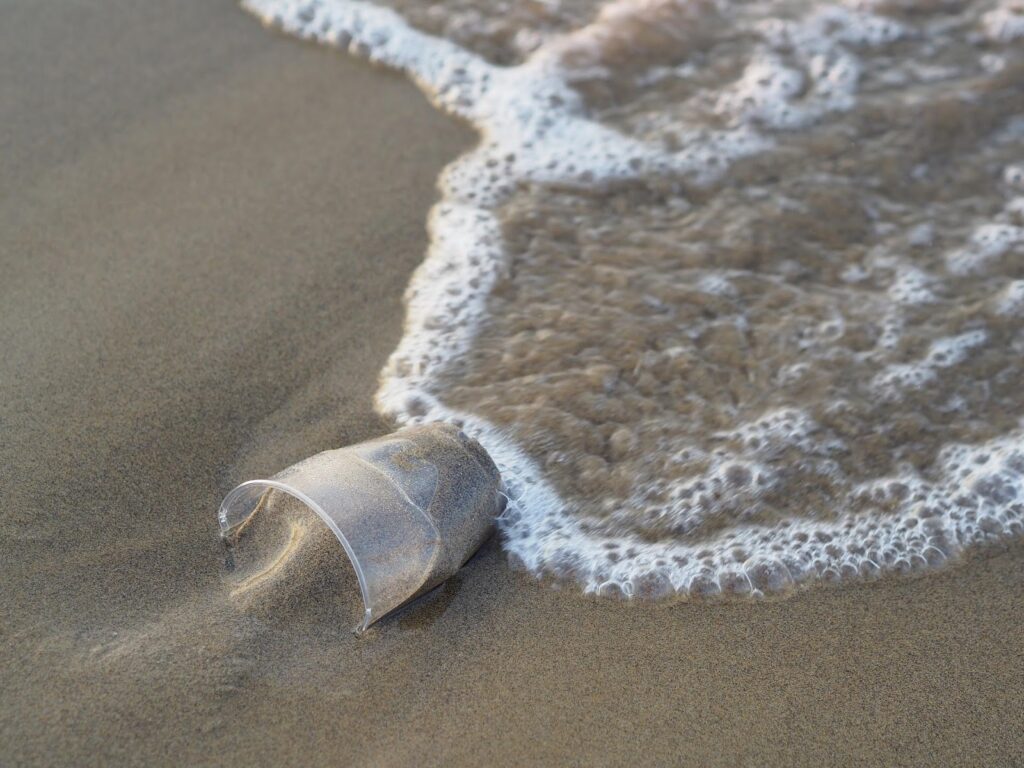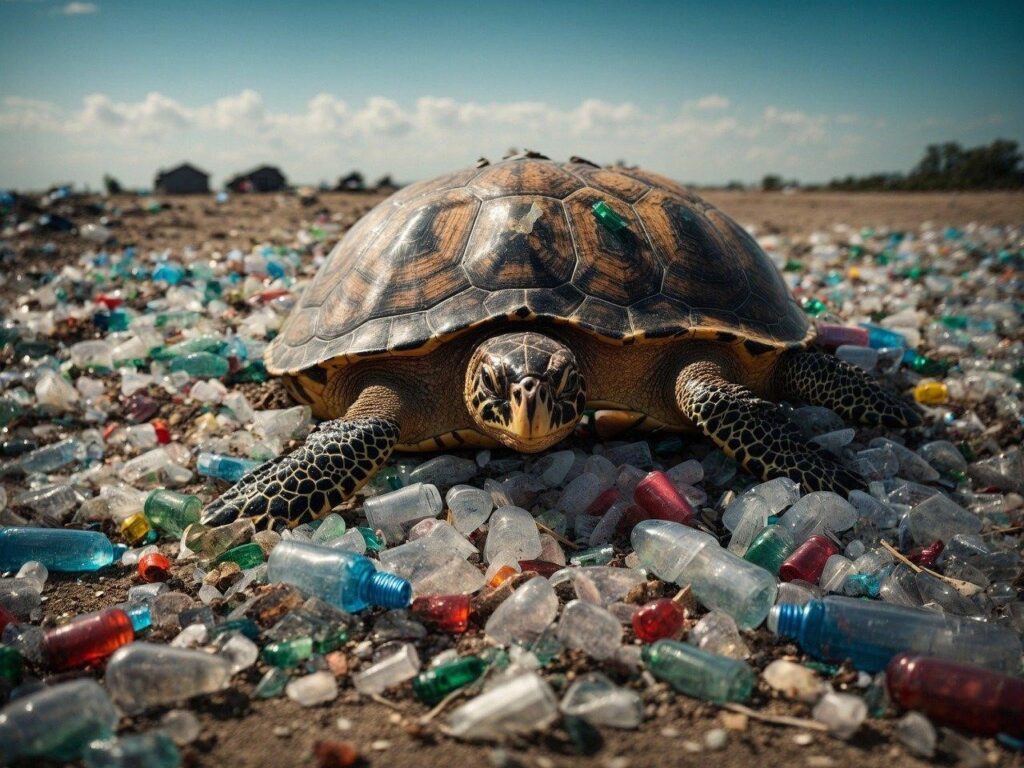 Picture credits: Image by flocking via Pixabay.
Picture credits: Image by flocking via Pixabay.
Drowning in Plastic: How Plastic Pollution is Destroying Nigeria
Background:
Historically, plastic was introduced to improve performance, reduce cost, and make our lives easy, but under the prevailing circumstances, plastic has become a global nuisance. Though plastic pollution is a global menace, its worst impact and big scale can be seen in Nigeria. If you take a walk through the streets of major Nigerian cities or take a look at the country’s sewers, rivers, lakes, and oceans, you will see discarded plastic waste everywhere.
Understanding Plastic Pollution
Land- and marine-based plastic pollution can be understood as an accumulation of plastic objects and particles in the environment that harms humans, wildlife, habitats, and biodiversity in general if not managed properly. It is important to understand that plastic pollution can negatively impact land, waterways, and oceans. A majority of the plastic that leads to pollution originates from packaging material and single-use plastic used for food and water consumption or sanitary use.
Now, why do we say that Nigeria is drowning in plastic?
What is the magnitude of plastic pollution in Nigeria? Nigeria, with a land area of 923,768 km2 and an estimated population of 211.4 million, generates an estimated 2.5 million tons of plastic waste annually, with less than 12% being recycled. According to reports, in 2018, 20% of the plastic waste generated in Nigeria was produced within 30 km of the coast, with a significant part of it ending up in the ocean. On a global scale, Nigeria ranks as the 9th highest contributor to plastic pollution. However, with the rapidly increasing population, the situation is likely to get worse.
Major factors contributing to increased plastic waste in Nigeria are:
The use of water sachets, bottled water/ drinks, food takeaway packs, straws, spoons, etc. Research suggests that around 60 million plastic water sachet/bags are disposed of daily in Nigeria.
Indiscriminate waste disposal, poor waste management habits and lack of knowledge about proper disposal methods.
Lack of knowledge about recycling and availability of recycling facilities.
Lack of awareness of the potential environmental and health risks associated with plastic pollution.
Implications of plastic pollution on Nigeria and its residents:
Plastic pollution is currently causing detrimental effects on Nigeria’s health, environment, and economy. These impacts manifest in various ways:
Economic Implications: The sheer scale of discarded plastic scattered across roads, beaches, and coasts deters tourists and has a significant impact on income from the tourism sector.
When plastic flows into the oceans and is consumed by fish and other marine organisms, they die due to choking and poor-quality water. This is a huge blow to the fishing sector. Another economic consequence of plastic pollution is the significant financial burden of managing the huge plastic waste. There is a huge amount of resources and effort required to address the plastic cleanup.
Social Implications: Unsightly heaps of discarded plastic waste overwhelm major cities across Nigeria, with some obstructing major roads and waterways. However, beyond the aesthetic considerations, the scale of plastic waste highlights a significant deeper societal issue: its negative impact on public health and well-being.
Environmental Implications: Plastic pollution poses a significant threat to Nigeria’s environment, including soil, water, and air. The burning of plastic waste releases harmful toxins into the atmosphere but also degrades the soil quality. The accumulation of plastic waste blocks drainage systems, aggravating flood risks and disrupting natural water channels.
Most discarded plastics persist in the environment due to their low degradability, polluting surface water and tap water, and are ingested by aquatic and terrestrial animals when macroplastics are broken into microplastics by the action of the sun, water, and other processes. What adds to the problem is the property of microplastics to act as vectors for toxic chemical substances that they adsorb and consequently leach into biological systems.
When humans or such fishes and organisms consume this water, they enter our system and could potentially be associated with adverse health conditions.
Health Implications: The World Health Organization (WHO) has identified that chemicals released during plastic burning can be a serious health hazard. Dioxin, the chemical so released, can be potentially linked to health issues affecting cells, the immune system, hormones, and reproductive health.
 Image by TheDigitalArtist via Pixabay.
Image by TheDigitalArtist via Pixabay.
Who will clean this plastic up?
The major question now arises as to who should be responsible for cleaning up plastic waste in Nigerian soil, water, and air. Policymakers? Producers/manufacturers? Multinational companies? Citizens? The right answer would be all of them.
- Government and policymakers: A part of the onus to clean this plastic up lies on the government by making and implementing policies and regulations regarding the production, usage, and disposal of plastic, including the extended producer responsibility policy, the plastic waste management policy, etc. This would also include incentives to encourage people to recycle plastic and dispose of it in more responsible and environment-friendly ways. Responsible members of the government should also be looking at other countries’ policies on plastic waste management.
- Citizens: Residents could contribute to cleaning up the plastic that they discard and take responsibility in the spirit of environmental citizenship. Citizens must use plastic responsibly and dispose of and recycle them appropriately. Citizens could also organise and participate in city, beach, mangroves, and ocean cleanup drives to check the spread of plastic pollution. Citizens should actively work along with recyclers in their cities and encourage others to participate in cleaning discarded plastic.
- Producers and manufacturers: Producers and manufacturers should, in the first place, reduce plastic waste in their manufacturing processes and must take some responsibility in cleaning the plastic they produce, which ends up as waste. producers can reduce plastic waste in Nigeria if they include it in all the elements of corporate social responsibility. Doing so will promote sustainable development in the country. In Nigeria, most companies focus on fulfilling the philanthropic dimension of corporate social responsibility by organising voluntary cleanup campaigns, labelling products appropriately to indicate recyclability, advocating for proper disposal of waste, etc. However, if they incorporate:
- Economic (assigning an economic value to waste and not focusing solely on profits and competition),
- Ethical (prevent and clean up waste following societal expectations), and
- Legal dimensions (comply with government laws and regulations for the environment)
By embracing corporate social responsibility, many companies will have the ability to make significant and enduring contributions toward reducing plastic waste.
Watching the scale of plastic pollution in Nigeria, every individual must work together to combat it and follow an interdisciplinary approach along with private-public partnerships, from creating awareness (mandatorily in primary, secondary schools, and tertiary institutions) about the hazards of plastic pollution to promoting proper recycling and disposal practices.
In fact, in September 2021, the Government of Nigeria joined the efforts to fight plastic pollution with the World Economic Forum’s Global Plastic Action Partnership. The initiative aims to bring together policy-makers, business leaders, and civil society organisations to combat plastic pollution in Nigeria.
Simran Randhawa.

